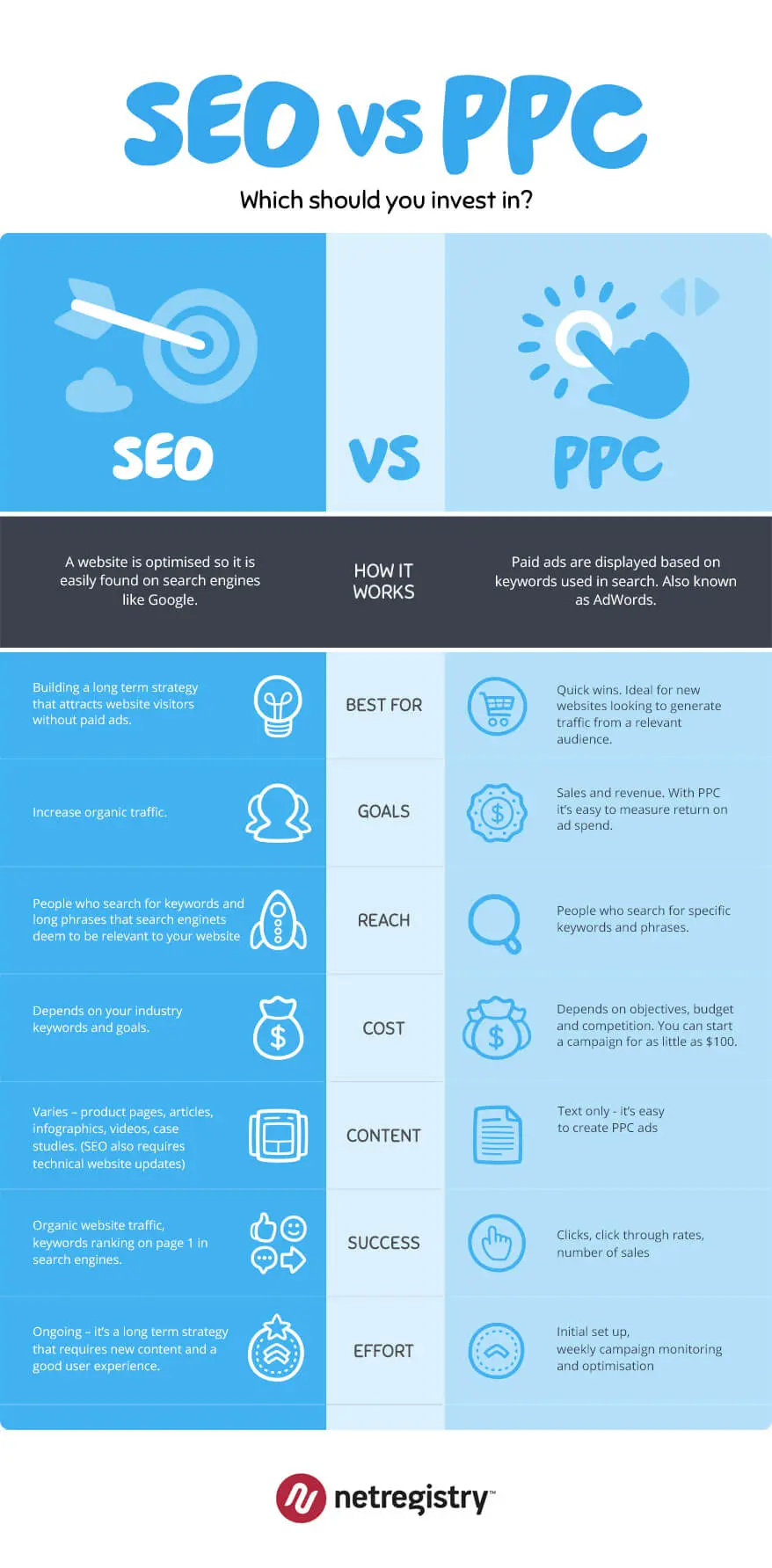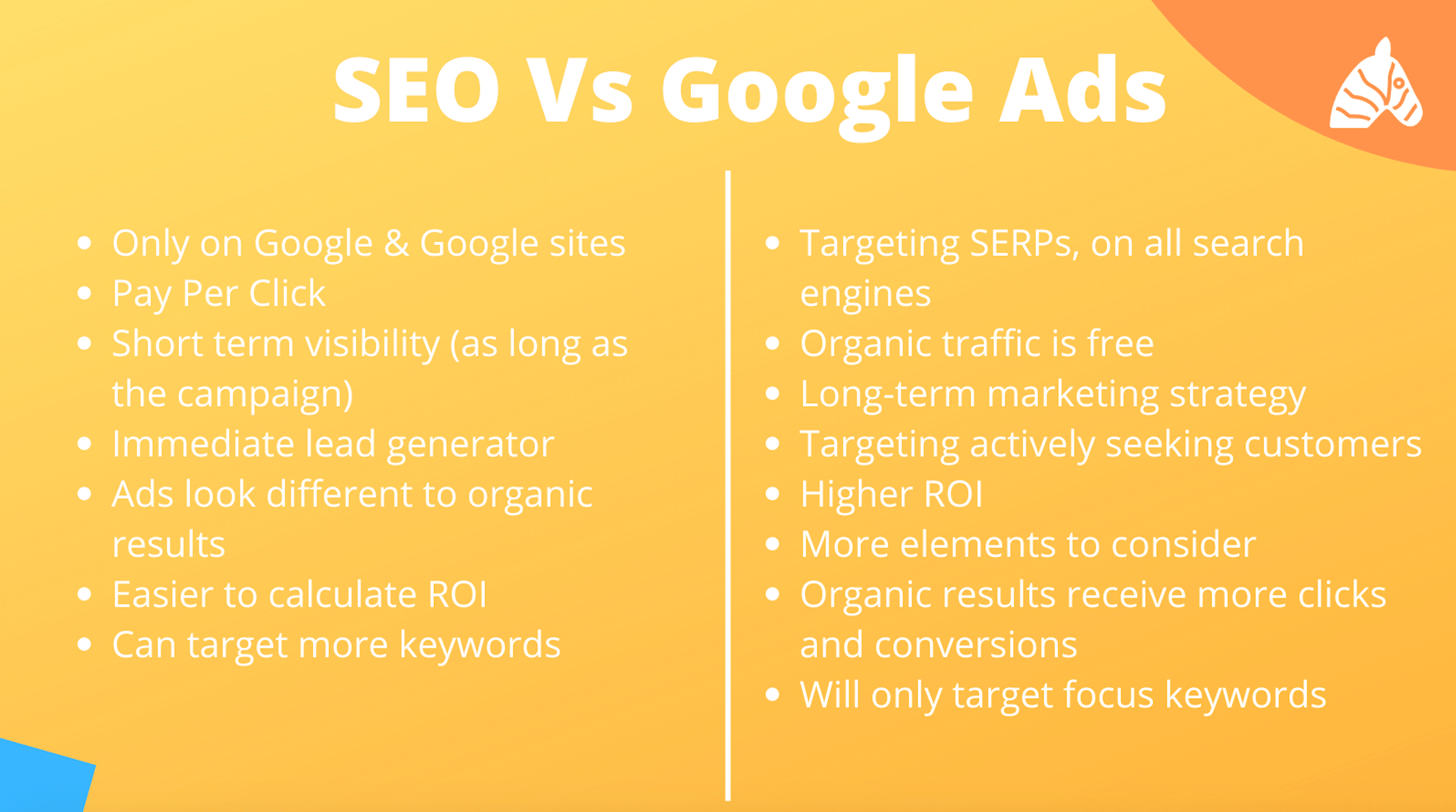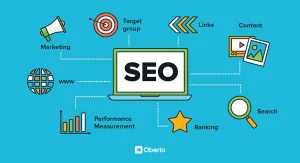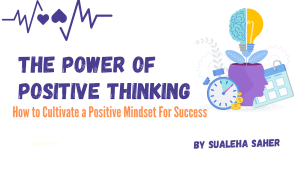In the evolving world of digital marketing, the debate between the effectiveness of SEO and Google Ads is more relevant than ever. Each strategy offers unique advantages and can dramatically influence the visibility and success of a business online. However, understanding the nuances and long-term implications of each can redefine what is perceived as a ‘waste of money’ in the digital marketing arsenal.
While Google Ads provides immediate visibility and a direct influx of traffic, SEO builds a sustainable foundation for organic reach that no paid ads can match over time. HubSpot reports that organic SEO is about 5.66 times better than paid search ads. This undeniable efficiency highlights that SEO, rather than being a waste, is a strategic investment in building an authoritative online presence. In contrast, Google Ads commands immediate results which are essential for new products or timely promotions.
| Feature | SEO | Google Ads |
|---|---|---|
| Cost Efficiency | Lower cost over time with organic results. | Higher immediate cost, pay-per-click model. |
| Time to See Results | Longer time required, gradual improvement. | Immediate visibility as soon as campaigns start. |
| Targeting | Keyword-based targeting aligns with organic search queries. | Highly specific targeting options including demographics, interests, and behaviors. |
| Longevity of Results | Long-term benefits, maintains results post-implementation. | Results are dependent on continued funding of ads. |
| ROI Measurement | Difficult to measure immediately, better seen over longer periods. | Easy to measure and offers quick feedback on campaign effectiveness. |

Overview of SEO and Google Ads
SEO and Google Ads are two powerful tools used in digital marketing. They help businesses get noticed on the internet. Though they aim to increase visibility, they work in different ways.
Overview of SEO
SEO stands for Search Engine Optimization. It’s like giving your website a map so people can find it more easily when they search online. SEO helps your site show up higher on the list when people search for things you offer.
Using SEO, we focus on words that people type into search engines. These are called keywords. The right keywords help connect searchers with your site. It’s about making matches between searches and your business.
SEO isn’t just about words. It also includes making your website easy to use and navigate. When your site is user-friendly, more visitors might stay longer, helping your website to rank even better.
Getting other websites to link to yours is another SEO strategy. This is like having friends vouch for you; it tells search engines your site is trustworthy and should be higher up in search results.
SEO takes time to work. Unlike ads, you won’t see results immediately. However, once it starts working, it can bring steady traffic to your website.
Overview of Google Ads
Google Ads is a quicker way to bring people to your site by using paid advertising. When people search for things related to your ads, your ad might pop up above the normal search results. This gets your site noticed fast.
With Google Ads, you pay to have your website shown at the top of the search page. The amount you pay depends on how many people click on your ad. This is called Pay Per Click or PPC.
Google Ads lets you target specific types of people. This means your ads are shown to those most likely to be interested in what you offer. This targeted approach helps maximize your advertising dollars.
One of the perks of Google Ads is that you can start and stop it anytime. This flexibility lets you use ads when it’s most beneficial for your business, like during special sales or promotions.
While Google Ads can bring you quick results, it doesn’t improve your site’s natural ranking in search engines. Once you stop paying for ads, the extra traffic might stop too.
Key Features Compared
SEO and Google Ads both aim to increase a website’s visibility, but they do so in very different ways. Understanding these differences can help businesses decide where to invest their marketing efforts.
Feature 1: Cost
SEO often requires less money to start. You mostly need to invest in creating good content and optimizing your site. Over time, it can be more cost-effective as it brings in ‘free’ traffic.
Google Ads requires a budget for ads. You pay every time someone clicks on your ad. While it can get pricey, you also control how much you spend each day.
Feature 2: Traffic Generation
SEO grows traffic slowly and steadily. As your site becomes more trusted by search engines, it attracts more visitors naturally. This takes time but is very rewarding.
Google Ads works fast. It puts your site in front of potential visitors right away. If you need quick traffic, it’s a great option.
Feature 3: Targeting
SEO targets through keywords. If someone searches for a keyword you’ve optimized for, they might find your site. This method appeals to anyone searching for those terms.
Google Ads allows more precise targeting. You can aim at specific demographics like age, location, or interests. This fine-tuning helps reach more specific audiences.
Feature 4: Duration of Results
SEO has long-lasting effects. Once you rank high in search results, you can stay there for a long time with little upkeep. It builds a strong online presence.
Google Ads stops showing your ads once you stop paying. The traffic from ads sometimes ends as quickly as it began unless you continue funding it.
Feature 5: Conversion Rates
SEO often has a higher conversion rate over time because it brings in users who are already interested in what you provide. They found you by searching relevant keywords.
Google Ads can also have high conversion rates, especially if targeted well. However, eager customers who click might not always be ready to purchase or commit.
Key Takeaways
- SEO is more cost-effective in the long run than Google Ads.
- Google Ads offers immediate traffic and visibility.
- SEO results grow over time and are more sustainable.
- Google Ads require ongoing investment for visibility.
- SEO enhances organic search credibility and authority.

SEO vs Google Ads – which is better?
Frequently Asked Questions
Exploring the differences between SEO and Google Ads can help companies make informed decisions about their digital marketing strategies. Here are some frequently asked questions to clarify their roles and effectiveness.
How long does it typically take to see results from SEO compared to Google Ads?
SEO generally requires more time to see noticeable results than Google Ads. Building organic search visibility can take several months or more because it depends on content quality, backlink profiles, and ongoing optimizations. Persistent effort is critical.
In contrast, Google Ads can begin generating traffic immediately after campaign setup and launch. This method allows businesses to measure results instantly and make quick adjustments to improve ad performance.
Can SEO and Google Ads be effectively integrated?
Yes, integrating SEO and Google Ads can be highly effective. Running both strategies concurrently provides the benefits of immediate traffic from paid ads and long-term growth from organic results. Additionally, data from Google Ads can inform SEO strategies by highlighting effective keywords and user behaviors.
Integration also allows for a more comprehensive analytics overview, enabling businesses to optimize their marketing strategies across multiple channels and improve overall return on investment.
Which strategy provides a better return on investment (ROI)?
The ROI from SEO and Google Ads can vary greatly depending on industry, target audiences, and execution. Typically, SEO is regarded as having a higher ROI in the long term because it delivers consistent organic traffic without the need for ongoing spending.
Google Ads can offer a quicker ROI, especially useful for new product launches or seasonal promotions. However, it requires continuous investment to sustain traffic flow, making it potentially more expensive over time.
How do I determine which strategy is best suited for my business needs?
Determining the best strategy depends on your business goals, budget, and timeline. For immediate results or highly targeted campaigns, Google Ads is more suitable, whereas SEO is better for long-term branding and organic growth.
Conducting a needs analysis, including timing, competitive landscape, and marketing objectives can guide the decision. Often, a combination of both strategies is most effective in achieving diverse marketing goals.
Does the effectiveness of SEO and Google Ads vary by industry?
Yes, the effectiveness of SEO and Google Ads can vary significantly by industry. For industries with high customer lifetime value, like legal or healthcare, SEO can yield exceptionally beneficial results due to the importance of trust and informational content.
Conversely, in fast-paced markets like retail or events, Google Ads can be more effective at quickly capturing consumer interest and conversion. Each industry requires a tailored approach to capitalize on the specific behaviors and preferences of its audience.
SEO Is A Waste Of Time in 2024
Final Thoughts
The decision between investing in SEO or Google Ads should not necessarily be seen as a choice of one over the other. Both strategies possess distinct advantages and serve different purposes within a holistic digital marketing strategy. Understanding the unique benefits and limitations of each can guide businesses to allocate resources effectively.
Ultimately, the integration of SEO and Google Ads often yields the best outcomes, leveraging the immediate impact of Google Ads and the enduring value of SEO. By balancing short-term gains with long-term ambitions, businesses can build a robust online presence that supports sustainable growth and competitive advantage.




